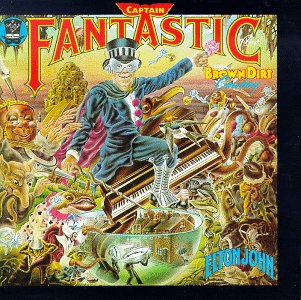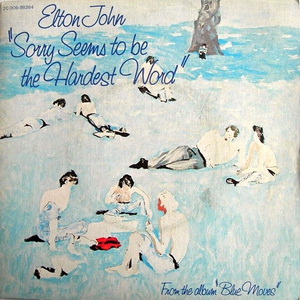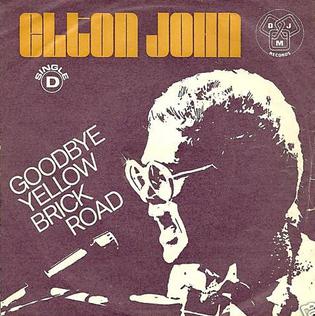
Honky Château is the fifth studio album by English musician Elton John. It was released on 19 May 1972, and was titled after the 18th century French chateau where it was recorded, Château d'Hérouville. The album reached number one on the US Billboard 200, the first of John's seven consecutive US number one albums.

Caribou is the eighth studio album by English musician Elton John, released on 24 June 1974 by MCA Records in the US and on 28 June by DJM Records in the UK. It was his fourth chart-topping album in the United States and his third in the United Kingdom. The album contains the singles "Don't Let the Sun Go Down on Me", which reached number 16 in the UK Singles Chart and number two in the US, and "The Bitch Is Back", which reached number 15 in the UK and number four in the US. Both singles reached number one in Canada on the RPM 100 national Top Singles Chart, as did the album itself.

Captain Fantastic and the Brown Dirt Cowboy is the ninth studio album by English musician Elton John. The album is an autobiographical account of the early musical careers of Elton John and his long-term lyricist Bernie Taupin. It was released in May 1975 by MCA Records in America and DJM in the UK and was an instant commercial success. The album was certified gold before its release, and reached No. 1 in its first week of release on the US Billboard 200, the first album to achieve both honours. It sold 1.4 million copies within four days of release, and stayed in the top position in the chart for seven weeks.

"Daniel" is a song written by English musician Elton John and his long-time songwriting partner Bernie Taupin, and performed by John. It was first released on John's 1973 album Don't Shoot Me I'm Only the Piano Player.

"Candle in the Wind" is a threnody written by English musician Elton John and songwriter Bernie Taupin, and performed by John. It was originally written in 1973, in honour of Marilyn Monroe, who had died 11 years earlier.

"Your Song" is a song written by musician Elton John and lyricist Bernie Taupin, and performed by John. It was John's first international Top 10 chart single.

"Crocodile Rock" is a song written by Elton John and Bernie Taupin, and recorded in summer 1972 at the Château d'Hérouville studio in France, where John and his team had previously recorded the Honky Château album. It was released on 27 October 1972 in the UK and 20 November 1972 in the U.S., as a pre-release single from his forthcoming 1973 album Don't Shoot Me I'm Only the Piano Player, and became his first U.S. number-one single, reaching the top spot on 3 February 1973, and staying there for three consecutive weeks. In the U.S., it was certified Gold on 5 February 1973 and Platinum on 13 September 1995 by the RIAA.

"Levon" is a song written by English musician Elton John and songwriter Bernie Taupin, and performed by John. It was recorded on 27 February 1971, and was released on John's 1971 album, Madman Across the Water. Backing vocals are provided by Tony Burrows. Paul Buckmaster wrote the orchestral arrangements and directed the orchestra.

"Someone Saved My Life Tonight" is a song, with music by English musician Elton John and lyrics by Bernie Taupin, from John's 1975 album Captain Fantastic and the Brown Dirt Cowboy. It was released as a single on 23 June 1975, the only single released from the album. Like the rest of the album, the song is autobiographical, and addresses an attempted suicide by John.

"Sorry Seems to Be the Hardest Word" is a song written by English musician Elton John and songwriter Bernie Taupin. It was recorded by Elton John and released in 1976, both as a single and as part of the Blue Moves album. It was John's second single released by The Rocket Record Company. The song is a mournful ballad about a romantic relationship which is falling apart.

"Goodbye Yellow Brick Road" is a ballad written by English musician Elton John and songwriter Bernie Taupin, and performed by John. It is the title track on John's album of the same name. The titular road is a reference to L. Frank Baum's The Wizard of Oz film and book series.

"Bennie and the Jets" is a song written by English musician Elton John and songwriter Bernie Taupin, and performed by John. The song first appeared on the Goodbye Yellow Brick Road album in 1973. "Bennie and the Jets" has been one of John's most popular songs and was performed during his appearance at Live Aid.

"I Guess That's Why They Call It the Blues" is a song by English musician Elton John, with music by John and Davey Johnstone and lyrics by Bernie Taupin, released as the first single from John's 17th studio album Too Low for Zero. It was the first single since 1975's "Someone Saved My Life Tonight" to feature the classic lineup of the Elton John Band.

"The Last Song" is a song by English musician Elton John, released as the third single from his 23rd studio album, The One (1992). It was composed by John, with lyrics provided by Bernie Taupin. The song marked the first of John's American singles to benefit his AIDS foundation. It reached No. 7 in Canada and No. 21 in the United Kingdom while peaking within the top 40 in several countries worldwide, including Australia, Ireland, New Zealand, and the United States.

"The Bitch Is Back" is a rock song written by English musician Elton John and songwriter Bernie Taupin, and performed by John. It was the second single released from John's 1974 album Caribou, and reached number 1 in Canada, number 4 in the United States and number 15 in the United Kingdom.

"This Train Don't Stop There Anymore" is the final track on Elton John's 2001 album Songs from the West Coast. Written by John and Bernie Taupin, the song's lyrics detail John's fame being over and his coming to terms with getting older but still keep touring and giving great performances around the world. It was released as the second single from the album and reached No. 24 in the UK Singles chart and was a Top 10 Adult Contemporary chart hit in the US. The song was less successful in the Netherlands, reaching only at No. 83.

"Empty Garden (Hey Hey Johnny)" is a song by English musician Elton John, written by John and Bernie Taupin, which first appeared on his sixteenth album Jump Up! released in 1982. It was the second single of the said album in the UK, and the lead single in the United States. The song is a tribute to John Lennon, who had been murdered 15 months earlier.

"The One" is the title track and first single released from English musician Elton John's 1992 album of the same name. On bonus footage for the DVD release of his concert Live in Barcelona, John states that he felt an intense connection to Bernie Taupin's lyrics for the song, in light of his personal circumstances around the time of making the album, in particular the line "for each man in his time is Cain until he walks along the beach".

The albums discography of British musician and singer-songwriter Elton John consists of 31 studio albums, 5 live albums, 10 soundtrack albums, 16 compilation albums, 4 extended plays, 3 tribute albums, 4 collaboration albums, and 2 holiday albums.

"Heartache All Over the World" is an upbeat song by English musician Elton John from his 20th studio album, Leather Jackets (1986). Written by John and Bernie Taupin, it was released as the album's lead single in September 1986, charting at number 45 in the UK Singles Chart and at number 55 on the US Billboard Hot 100, and reaching the top 10 in Australia, where it peaked at number 7. The song talks about not being able to date for a night.


















